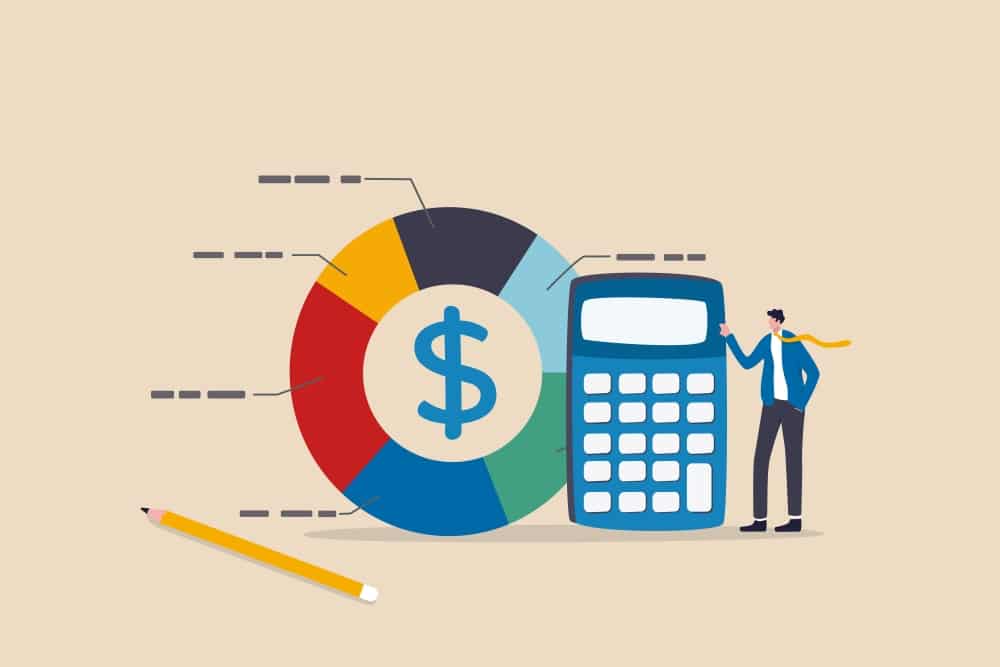How much is enough to retire? In the past, $1 million appeared to be sufficient for many Americans, but over the years, $2 million has overtaken it as the popular idea of how much you should save for retirement.
But is $2 million enough?
Clients and individual investors frequently ask if they can retire with $2 million, and the answer is always complicated. For some individuals, it’s plentiful, but for others, $2 million will barely cover their expected retirement expenses.
The range is vast. A recent report found that many Americans believe $1.46 million is sufficient. However, someone with an annual income of $100,000 may require closer to $3 million once they retire – without considering potential dependents.
Let’s dive into how a $2 million retirement plan works.
Key Takeaways
- The sufficiency of $2 million for retirement varies widely based on individual circumstances, such as expected lifespan, lifestyle, current and future expenses, and financial goals. Proper planning and realistic expectations are crucial for financial stability in retirement.
- A balanced retirement income should come from multiple sources, including Social Security, pensions, investment accounts, and personal savings. Understanding tax implications and adopting a strategic withdrawal plan—such as the traditional order of withdrawing from taxable accounts first—can significantly affect long-term sustainability.
- Engaging a qualified financial advisor can help tailor retirement plans to individual needs, identify tax mitigation strategies, and navigate complexities, especially for couples. This personalized guidance is essential for ensuring that retirement funds last throughout one's lifetime.
Sustainable Retirement Planning Fundamentals
Ideally, you won’t be just surviving retirement but thriving. For that reason, proper financial planning is critical. Ensuring that your retirement plan is sustainable is paramount because the last thing you want to do is outlive your funds.
Certain retirement planning fundamentals remain the same, regardless of the amount you have in your account at the beginning of your retirement. For example, you will need to consider your:
- Current income
- Current Expenses
- Expected expenses post-retirement
- Financial goals
- Retirement age
- Retirement income sources
Even with the flat figure of $2 million, it’s not always easy to calculate the curve of what’s needed for retirement. Inflation, increased healthcare costs, and uncertain markets are just a few variables that are challenging to calculate alone. Furthermore, each retirement account type has its own tax regulations.
Some templates and books include basic instructions for laying out fundamentals. However, financial advisors provide tailor-made plans, often testing variables for potential situations – such as stock market crashes or inflation. For that reason, financial advisors provide additional value and insight into the entire process.
But for now, let’s continue with the basics.
Building a Balanced Retirement Income

Generally, a balanced retirement budget will incorporate income from multiple sources. Traditional retirement income includes:
- Social security
- Pensions
- Self-funded IRAs and 401(k)s
- Brokerage accounts
However, your retirement income will depend on your specific circumstances.
Let’s say you have $2 million saved among all of your accounts. But there are several considerations to determine if it’ll be enough. For example:
- How long do you expect to live after retirement?
- Will the amount be used to support yourself and a dependent, such as a child, grandchild, or spouse?
- What are your current expenses?
- What types of accounts are you using, and will you owe taxes on what you take out?
- Do you have a way to replenish income while retired, or will you be draining the account?
- Will you have a mortgage or car loan?
- What healthcare expenses do you expect, based on your current health records and family history?
- Will you want to take up new hobbies in retirement?
- Will you want to travel extensively in retirement?
Making Your Dollar Last: Retirement Savings Strategies
Whether we like it or not, the calculation of whether $2 million is enough for retirement hinges on two factors: your life expectancy and expenses.
Let’s look at an example to get a general grasp of the key concepts of making your retirement funds last.
First, you’ll want to determine how long your retirement will be. Americans today live to around 76 on average. But if you reach 65, your life expectancy increases to age 86. That’s 26 years without income. But it can easily be longer. For our purposes, let’s say you expect to live until 80.
Next, you must calculate expenses. But before we get there, let’s consider strategies like the 4% rule. This traditional method dictates that you should withdraw 4% of your retirement funds, adjusted for inflation, to live on every year. So, if you have $2 million at retirement at age 60, you should be able to live on $80,000 per year, adjusted for inflation. If the inflation rate is 3%, then the next year, you would remove $82,400.
This will give you more than a decade in living expenses – barring serious injury, inflation hikes, or another significant expense.
Furthermore, if there is no plan for retirement account withdrawals, you may end up wasting money on taxes. It’s often prudent to consider contributing to tax-free accounts, such as a Roth IRA or Roth 401(k), to provide income without increasing your annual taxes.
Another key strategy is to postpone your Social Security benefits. The longer you wait, the more you will receive.
Deciding When to Retire

The big question for many upcoming retirees is when to finally transition into their golden years. When you retire has a significant impact on your savings.
Retiring earlier gets more complicated. Let’s say you want to retire at 40 but expect to live until 90. Then, you’ll need 50 years of retirement income, and $2 million will likely not cover your entire retirement costs.
The key to determining when to retire lies in your expected life expectancy. Once you estimate that number, it’s much easier to calculate what you’ll need to live comfortably without having to go back to work.
Plan for Taxes
Most retirement income streams require you to pay taxes, but some will not.
Investment income and Social Security will accrue taxes. Traditional IRAs and 401(k)s require you to pay taxes on withdrawals. However, Roth IRAs and Roth 401(k)s do not, as they are considered to be already taxed income. This difference is what makes tools like the mega backdoor Roth IRA so powerful. It allows you to reduce your tax liability by making after-tax contributions to one of these accounts.
There is no set rule regarding which savings account you should withdraw from first. Again, tax planning needs to be very specific to your unique situation. However, there is a traditional order for withdrawals that can be used as a starting point in the planning process:
- Taxable accounts
- Social Security
- Pre-tax retirement accounts
- Roth accounts
Tax planning is a complex process. Financial advisors can often help you mitigate your tax obligation and ensure you keep as much money as possible.
Case Studies: Retirement Scenarios
Let’s take a look at two examples of retirement planning (or lack thereof):
Poor Retirement Planning
Brian plans to retire at 60 with $2 million in retirement savings. He plans to withdraw 4% of his income in retirement and start taking social security at 67. He is single, with no dependents, and his only child is a financially secure adult. However, in retirement, he begins to take lavish vacations every summer. Retirement withdrawals come from whatever account is convenient at the time, leaving him open to taxes and overspending. Within a decade, he has to downsize his house to an apartment and pick up a part-time job to supplement his retirement income.
Good Retirement Planning
Susie has also decided to retire at 60 with $2 million in retirement savings. She decides to delay social security until age 70 and withdraws only 3% of her yearly income. She lives with her husband, who plans to retire in a few years. She automated their bills from a specific bank account to avoid overspending. Susie has also prioritized her retirement accounts based on tax benefits and is holding off on using them. Instead, she uses cash reserves first, followed by taxable accounts. While she goes out with friends and pursues hobbies, she keeps spending to a budgeted amount. As a result, she is on track to maintain her savings for at least 20 years.
As we can see from these two examples, the amount of money is less of a factor than the mindset. Proper planning and realistic retirement expectations can lead to better financial stability in the long term.
Special Retirement Considerations for Couples
The formula gets more complicated for couples. Depending on your geography, lifestyle, and life expectancy of both partners, $2 million may be enough. But as with a single individual, the earlier you retire, the greater the likelihood you will outlive your savings. And this is doubly true for couples.
Successful planning for couples is a collaborative effort. It’s vital to have critical conversations about retirement expectations, life expectancy, and life goals early on. You may also want to coordinate who retires first and whether one or both partners will delay social security payments.
Furthermore, retirement planning often involves long-term healthcare and end-of-life decisions. These are essential conversations to have early on and should be reviewed in retirement.
A trusted, objective financial advisor can help you determine what a good monthly retirement income for a couple is and help you navigate the growing complexities of retirement planning for couples, legacy planning, and other related milestones.
Putting it all Together: Creating a Realistic Retirement Plan
Two million dollars is nothing to scoff at. It can provide a significant income for many individuals. But retirement funds are not a “one-size-fits-all” scenario. Retirement planning is so specialized to your life and goals that it cannot be generalized. And you don’t have to sift through the complexities alone.
Getting help for retirement planning is easier than ever. Qualified financial advisors can help you to create a realistic retirement plan tailored to your needs and goals. Advisors can also help you to identify tax mitigation strategies or design legacy plans for your heirs or preferred charities.
Don’t just trust any “experienced” advisor. You need to find experienced fiduciary advisors who are legally obligated to follow your best interests. You can find advisors like this online, and you can choose to work with one in your area or across the country. First Financial Consulting is a fiduciary firm offering 100% objective advice to clients seeking retirement planning advice.
Book a call with our expert advisors today and discover how we can help you simplify your retirement savings plan.
Greg Welborn is a Principal at First Financial Consulting. He has more than 35 years’ experience in providing 100% objective advice, always focusing on the client’s best interests.
Greg Welborn is a Principal at First Financial Consulting. He has more than 35 years’ experience in providing 100% objective advice, always focusing on the client’s best interests.
FAQ | Is 2 Million Enough to Retire
The answer depends on various factors such as your lifestyle, location, and expected expenses. If you plan on living modestly, $2 million might be enough to retire at 60. However, for those with higher expenses or dependents, it may not be sufficient. Working with a financial advisor to create a personalized retirement plan is critical.
A well-crafted retirement plan can help extend the length of your retirement savings. But how $2 million lasts in retirement will ultimately end up being decided by a variety of factors including (but not limited to):
- How long do you expect to live after retirement?
- How much of the $2 million will be used to support yourself and a dependent, such as a child, grandchild, or spouse?
- What are your current expenses?
- What types of accounts are you using, and will you owe taxes on what you take out?
- Do you have a way to replenish income while retired, or will you be draining the account?
- Will you have a mortgage or car loan?
- What healthcare expenses do you expect, based on your current health records and family history?
- Will you want to take up new hobbies in retirement?
- Will you want to travel extensively in retirement?
To maximize the longevity of your retirement savings, focus on tax-efficient strategies, such as being mindful of where and how much you are withdrawing from retirement accounts. Additionally, delaying Social Security benefits to increase your monthly payouts can help. You should also keep a close eye on healthcare costs and reduce unnecessary expenses. By maintaining a diversified portfolio and regularly reviewing your financial plan, you can ensure your money is well-managed and lasts throughout your retirement years.
Whether $2 million is enough for a couple depends on several factors, such as lifestyle, healthcare needs, location, and longevity. If you plan for modest spending and have supplemental income from Social Security or pensions, $2 million may be sufficient. However, couples with higher expenses or aspirations, like extensive travel or maintaining multiple homes, might require more. Careful planning and a diversified investment strategy are essential to ensure that your savings will last throughout retirement.
Inflation can significantly reduce the value of your $2 million over time, making everyday expenses like healthcare, housing, and utilities more expensive as you age. When dealing with inflation in retirement, it's essential to adjust your investment strategy. Consider diversifying into assets that tend to outperform during inflationary periods, such as real estate or Treasury Inflation-Protected Securities (TIPS). Managing withdrawal rates and working with a financial advisor can help ensure your savings last despite rising costs.


